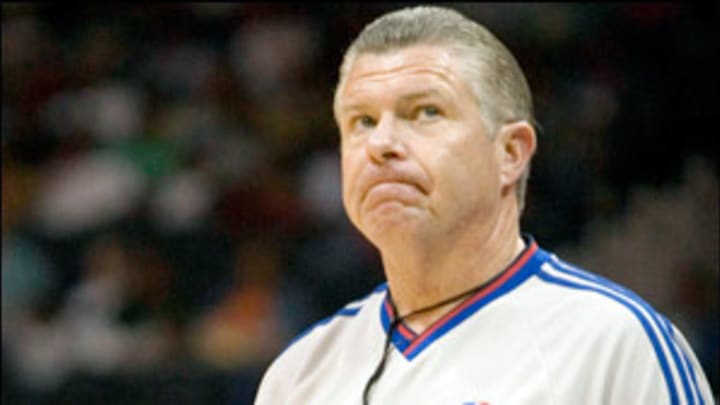Page-turning back story

I was closer to the older generation of retired refs (Jake O'Donnell, Eddie T. Rush, Bernie Fryer and the late Earl Strom to name a few) and remain closer to the more senior members of the current crew, especially Joey Crawford, Steve Javie and Dick Bavetta. There is a reason for this beyond the obvious fact that we are chronological contemporaries: The league has gradually discouraged contact between refs and the media, preferring that the striped-shirts be just that -- background scenery to the main event. That's a shame because many of these guys are fascinating personalities who bring unique life experiences to the job.
In the case of Bob Delaney, a 20-year veteran, that is a vast understatement. In fact, few personalities in the world of sports, or the world in general, have a more captivating back story than Delaney, whose league-desired anonymity will diminish -- if not disappear entirely -- with the Feb. 4 release of his autobiography, Covert: My Years Infiltrating The Mob.
With the help of co-author Dave Scheiber, a fine Florida-based journalist, Delaney, a former New Jersey state trooper, tells his tale lucidly and, best of all, understatedly. Delaney/Scheiber followed a cardinal rule of writing: The better the material, the more it should speak for itself. The writerly touches belong, I suspect, to Scheiber, but the blood-chilling drama about his time spent undercover with New Jersey Mafia types comes from Delaney's soul, his memory and, to be sure, a mountain of audio tapes that helped bring down the jaw-breakers and law-breakers who formed his social circle during three years of undercover work in the mid-1970s.
Delaney resists what would've been the simplistic notion of tying his current occupation to his previous one. Well, dear reader, after dealing with guys who would put a slug in my chest as easy as they'd say hello, I'm here to tell you that calling a technical on Rasheed Wallace isn't so difficult. Delaney is an excellent official but others are just as good, and they didn't spend three years wearing a wire around stone-cold killers. But it's beyond obvious that you learn quite a bit about composure and demonstrating grace under pressure when your every waking breath is spent wondering if your next breath is your last one.
"The development of your off-court personality is a reflection of your on-court personality," Delaney said on Thursday when we chatted by phone about the book. "I'm sure the situations I dealt with during my undercover years help me as an official because I understand how to function when I'm under pressure."
No ref is immune from criticism -- Delaney describes an incident in Madison Square Garden when his own mother hooted at him for blowing a foul call Patrick Ewing, her favorite player -- but his street cred with players and coaches is demonstrably apparent.
"I used to argue with Bob a lot," Boston Celtics coach Doc Rivers said. "Then I found out what he used to do and thought, 'I don't think he's going to be too affected by what I'm saying over here on the sideline.' "
A few years ago, Grant Hill, then with the Orlando Magic, jokingly patted down Delaney during a timeout and asked, "You still wired, Delaney?" The ref answered, "Yeah, I'm wired, and the last time I wore a wire, 50 people went to jail."
Several years ago during a TNT game Delaney was working, the announcers spotted Kobe Bryant talking to the referee after a foul call and theorized that the Los Angeles Lakers' star was giving Delaney "an earful" about the call. "In reality," Delaney said, "Kobe was asking what it was like wearing a wire all the time, and saying, 'That had to be wild.' "
It was wild. Kobe should read the book.
Before getting the whole story in Covert (the title comes from the surname that Delaney adopted during the joint state police-FBI sting operation), I knew a little bit about his background and that informed my observations of him as a referee. I couldn't help but wonder what Delaney was thinking when, say, the fifth guard on a bad team would berate him for making a traveling call. After what he had been through -- facing the prospect of death and, almost as bad, starting to "lose sight of the line where Bob Delaney ended and Bobby Covert began," as he writes in the book -- how can he take a call in a basketball game seriously?
But he does, and that is one of the messages (I'm not going to call them lessons) of Covert: that sports is an endless proving ground where professionalism matters. Delaney describes a moment early in his officiating career when he made an end-of-the-game call that, hours later, upon further review in his lonely hotel room, he found to be wrong. The fact that he blew a "gamer," the officials' term for a call that decides an outcome, put a knot in his stomach and cost him a night of sleep.
"In my profession," Delaney writes, "there's no worse feeling in the world."
Delaney's undercover life was spent in that same agitated state, wondering if he'd be found out the next day, worrying that he was losing what he describes as "the tug of war within," trying to ingratiate himself to the very people he was trying to bring down, thereby experiencing some form of the Stockholm syndrome. I can't imagine what a life it was, but it's all laid out in Covert.
And when I put it down, I was glad that the same era that gave us Tim Donaghy, a weasel of a law-breaker, has also given us Bob Delaney, a stand-up guy in a difficult profession.
